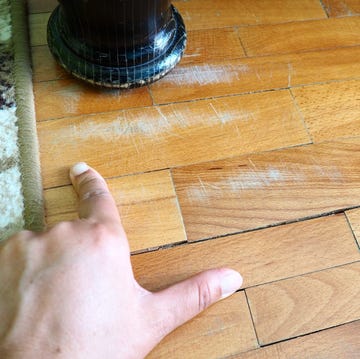Chores are the one thing we never run out of. Every day, there are surfaces that need wiping down, bins that need taking out and dishwashers that need filling, running and emptying. In short, it’s exhausting keeping up with the mess in our homes.
And the sad truth is, many of us carry this burden alone. A recent survey from Good Housekeeping found that 16% do all the chores all by themselves, while 43% admit to doing most of them. So, when you ask for a helping hand, you’re naturally looking for a little bit of support and empathy.
That’s why it’s incredibly frustrating when you’re met with comments like ‘I’ll do it later’, ‘It looks fine as it is’ and the all-time classic ‘Okay, stop nagging me’. It’s easy to see red when this happens, but there are ways to avoid such reactions and arguments. We’ve rounded up the best ways to get others in the household more involved in the chores, so you can share the load at last. Here’s where to start.
1. Make it fun (if you can)
It sounds doubtful, but there are ways to add an element of fun to the chores, especially when you want to get children involved. First, you can create a playlist of favourite songs to get them energised. Choose upbeat tunes that you know will keep everyone dancing and singing along. You could even be creative and compile a playlist to represent your cleaning woes; think Queen’s I Want To Break Free, TLC’s No Scrubs and Dolly Parton’s Washday Blues.
There’s the possibility of making a game out of the chores, too. E.g. who can pick up the most dust with a baby wipe? Or you could make up your very own scavenger hunt.
With children, it’s helpful to offer a reward afterwards as well. When I was young, my mum occasionally left a list of daily chores to complete while she was at work. I didn’t have to do them, but I knew I’d get pocket money if I did, so they were always done by the time she returned. Alternatively, you could offer a family outing afterwards, with your helpers choosing the activity or restaurant.
It’s not so easy to inject fun with adults, but again it’s not impossible. You could swap music for a favoured podcast or let them choose the film you’re watching later that night. Consider what they might enjoy cleaning, too, and let them have the priority there. Are there any tasks they find satisfying?
2. Schedule it into the diary
While we sometimes can’t help surprises, if you want to get others in the household more motivated to clean, it’s best not to spring it on them without notice.
Sometimes, it’s difficult to work up the motivation to start cleaning – it’s the same for everyone (it’s why the 5-minute clean routine is so popular). If we’re the ones choosing what to do and when, then it’s on our terms but for others, being told to do something they might not want to and out of the blue, not surprisingly may cause a prickly response.
Try to plan ahead; agree on what chores will be divvied up and when they will be done by. Schedule them into the diary and try to make a routine out of the plan if you need help on an ongoing basis. Our cleaning calendar can help you plan what needs doing by when.
3. Negotiate
If others in the household don’t see you cleaning, they likely won’t know how much time it takes or how overwhelmed you might be feeling by the endless to-do list. So, as you ask for help, make them aware of what you’re cleaning or have cleaned to keep things transparent.
If they’re questioning why they should hang up the washing, remind them that you do the ironing afterwards. Or if the floor needs a mop, mention that you’ve just vacuumed it for them; you can always offer to trade jobs if they have a preference. It should be clear that you’re sharing the workload rather than assigning it to them alone.
If someone’s not happy with their lot, you can each set a timer on your phone throughout the week to see how long you spend on chores. You can then reflect on the total and balance it out as needed; this might show others just how much work you put in.
If you have young children, help them to clean up after themselves day-to-day, so they know and see the work that goes into keeping things tidy. From automatically picking up a floordrobe, to carrying dirty dishes to the sink, this can encourage good habits.
4. Show them what it means to you
If members of your household really don’t want to help or they say they don’t understand why it’s needed, explain that these chores have meaning for you. If you’ve taken the time to request their help, you feel it’s a job worth doing. And once it’s done, it will ultimately make you feel happier in your home. While they might not care specifically about the cleaning, they will care about how it makes you feel and that can’t be argued.
Express yourself in a calm, but confident manner, so you’re not raising your voice or encouraging an argument.
5. Explain why it needs to be done
If all else fails, then explaining why the chores need doing can motivate, too. I recently admitted to my partner that I hadn’t vacuumed in a few weeks. He said it’s fine and no harm done, but then I told him it’s probably why our hay fever is so bad at home; the pollen is collecting in the carpet. When I came back from doing the dusting, he was vacuuming on his own accord.
Sometimes a little explainer on the importance of the chores can help others to realise it’s not all about the aesthetics or unseen bacteria. The bins need taking out, so they don’t overflow and smell – and attract flying ants; the shower needs wiping out so it’s not covered in limescale; and the washing needs doing so there’s enough clothes for next week. Remember why you’re doing these chores in the first place and flag that as you ask for help.




























